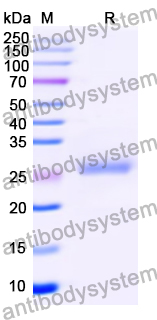Catalog No.
YMN41701
Expression system
E. coli
Species
Mus musculus (Mouse)
Protein length
Ser168-Tyr294
Predicted molecular weight
26.86 kDa
Nature
Recombinant
Endotoxin level
Please contact with the lab for this information.
Purity
>90% as determined by SDS-PAGE.
Accession
Q8BNX1
Applications
ELISA, Immunogen, SDS-PAGE, WB, Bioactivity testing in progress
Form
Lyophilized
Storage buffer
Lyophilized from a solution in PBS pH 7.4, 0.02% NLS, 1mM EDTA, 4% Trehalose, 1% Mannitol.
Reconstitution
Reconstitute in sterile water for a stock solution. A copy of datasheet will be provided with the products, please refer to it for details.
Shipping
In general, proteins are provided as lyophilized powder/frozen liquid. They are shipped out with dry ice/blue ice unless customers require otherwise.
Stability and Storage
Use a manual defrost freezer and avoid repeated freeze thaw cycles. Store at 2 to 8°C for frequent use. Store at -20 to -80°C for twelve months from the date of receipt.
Alternative Names
C-type lectin domain family 4 member G, Liver and lymph node sinusoidal endothelial cell C-type lectin, CLEC4G, LSECtin
Potential diagnostic marker gene set for non-alcoholic steatohepatitis associated hepatocellular carcinoma with lymphocyte infiltration., PMID:40386252
Mediators of the causal associations between protein ratios and ischemic stroke: a two-step Mendelian randomization study., PMID:40181221
Circulating inflammatory and immune response proteins and endometrial cancer risk: a nested case-control study and Mendelian randomization analyses., PMID:39278107
The Molecular Signature Related to Local Inflammatory and Immune Response in Canine Cutaneous Hypersensitivity Reactions: A Preliminary Study., PMID:39194759
Reversible ON- and OFF-switch receptors Clec4G and Rab1A reveal the hormetic effects of a pectin polysaccharide in Aralia elata (Miq.) Seem., PMID:39059090
Molecular Events in Immune Responses to Sublingual Influenza Vaccine with Hemagglutinin Antigen and Poly(I:C) Adjuvant in Nonhuman Primates, Cynomolgus Macaques., PMID:38932372
Global Gene Expression Profiling and Bioinformatics Analysis Reveal Downregulated Biomarkers as Potential Indicators for Hepatocellular Carcinoma., PMID:38911766
Serum proteome signatures associated with ileal and colonic ulcers in Crohn's disease., PMID:38763457
Reduced Expression of CLEC4G in Neurons Is Associated with Alzheimer's Disease., PMID:38731839
Identification of Hub Genes in Liver Hepatocellular Carcinoma Based on Weighted Gene Co-expression Network Analysis., PMID:38683466
Identification of receptors and factors associated with human coronaviruses in the oral cavity using single-cell RNA sequencing., PMID:38560173
Can inflammatory plasma proteins predict Long COVID or Fatigue severity after SARS-CoV-2 infection?, PMID:38508399
Cirrhosis-downregulated LSECtin can be retrieved by cytokines, shifts the TLR-induced LSECs secretome and correlates with the hepatic Th response., PMID:38293766
Characterization of the Immune Microenvironment and Identification of Biomarkers in Chronic Rhinosinusitis with Nasal Polyps Using Single-Cell RNA Sequencing and Transcriptome Analysis., PMID:38229690
CD301 and LSECtin glycan-binding receptors of innate immune cells serve as prognostic markers and potential predictors of immune response in breast cancer subtypes., PMID:38206856
The elevation of plasma galectin-9 levels in patients with psoriasis and its associations with inflammatory and immune checkpoint molecules in skin tissues., PMID:38092632
C-type Lectin Domain Family 4 Member G (CLEC4G) Is a Negative Marker for CD34 in the Evolution of Liver Pathogenesis., PMID:37625828
Novel inflammatory biomarkers associated with stroke severity: results from a cross-sectional stroke cohort study., PMID:37468969
Transcriptomics unravels molecular changes associated with cilia and COVID-19 in chronic rhinosinusitis with nasal polyps., PMID:37085563
ACE2-Independent Alternative Receptors for SARS-CoV-2., PMID:36423144
Changes in the proteome and secretome of rat liver sinusoidal endothelial cells during early primary culture and effects of dexamethasone., PMID:36054185
SARS-CoV-2 cell entry beyond the ACE2 receptor., PMID:35754059
Effect of SARS-CoV-2 Entry Factors on Myeloid Cancers., PMID:35283406
Genome-wide CRISPR activation screen identifies candidate receptors for SARS-CoV-2 entry., PMID:34431042
Identification of lectin receptors for conserved SARS-CoV-2 glycosylation sites., PMID:34375000
Single-cell RNA sequencing of SARS-CoV-2 cell entry factors in the preconceptional human endometrium., PMID:34329437
Identification and Validation of Hub Genes Associated With Hepatocellular Carcinoma Via Integrated Bioinformatics Analysis., PMID:34277395
A facile chemoenzymatic synthesis of SARS-CoV-2 glycopeptides for probing glycosylation functions., PMID:34236361
Virological and immunological features of SARS-CoV-2-infected children who develop neutralizing antibodies., PMID:33730580
Lung expression of genes putatively involved in SARS-CoV-2 infection is modulated in cis by germline variants., PMID:33649539
Combined inhibition of PD-1/PD-L1, Lag-3, and Tim-3 axes augments antitumor immunity in gastric cancer-T cell coculture models., PMID:33611641
C-type Lectin CD209L/L-SIGN and CD209/DC-SIGN: Cell Adhesion Molecules Turned to Pathogen Recognition Receptors., PMID:33375175
Predicting HCC Response to Multikinase Inhibitors With In Vivo Cirrhotic Mouse Model for Personalized Therapy., PMID:33340714
Transcriptome and proteome profiling reveal complementary scavenger and immune features of rat liver sinusoidal endothelial cells and liver macrophages., PMID:33246411
Understand variability of COVID-19 through population and tissue variations in expression of SARS-CoV-2 host genes., PMID:33072849
Endothelial GATA4 controls liver fibrosis and regeneration by preventing a pathogenic switch in angiocrine signaling., PMID:32916216
Transcriptomes from German shepherd dogs reveal differences in immune activity between atopic dermatitis affected and control skin., PMID:32556497
Gene expression and DNA methylation analyses suggest that immune process-related ADCY6 is a prognostic factor of luminal-like breast cancer., PMID:31886586
Hepatic Endothelial Notch Activation Protects against Liver Metastasis by Regulating Endothelial-Tumor Cell Adhesion Independent of Angiocrine Signaling., PMID:30530502
C-type lectin receptor LSECtin-mediated apoptotic cell clearance by macrophages directs intestinal repair in experimental colitis., PMID:30301800
Chemoenzymatic Synthesis of N-glycan Positional Isomers and Evidence for Branch Selective Binding by Monoclonal Antibodies and Human C-type Lectin Receptors., PMID:29894153
The Myeloid LSECtin Is a DAP12-Coupled Receptor That Is Crucial for Inflammatory Response Induced by Ebola Virus Glycoprotein., PMID:26943817
Clec4g (LSECtin) interacts with BACE1 and suppresses Aβ generation., PMID:25957769
iTRAQ-based proteomics reveals novel members involved in pathogen challenge in sea cucumber Apostichopus japonicus., PMID:24949634
Distinct usage of three C-type lectins by Japanese encephalitis virus: DC-SIGN, DC-SIGNR, and LSECtin., PMID:24623090
DC-SIGN, DC-SIGNR and LSECtin: C-type lectins for infection., PMID:24156700
Mobility study of individual residue sites in the carbohydrate recognition domain of LSECtin using SDSL-EPR technique., PMID:22711492
Cell surface molecules involved in infection mediated by lymphocytic choriomeningitis virus glycoprotein., PMID:22673088
Novel roles of liver sinusoidal endothelial cell lectin in colon carcinoma cell adhesion, migration and in-vivo metastasis to the liver., PMID:22637699
Identification of cell surface molecules involved in dystroglycan-independent Lassa virus cell entry., PMID:22156524

